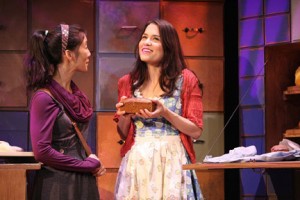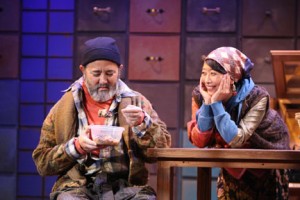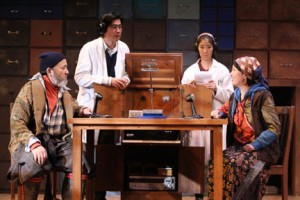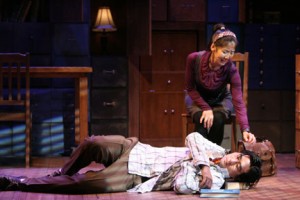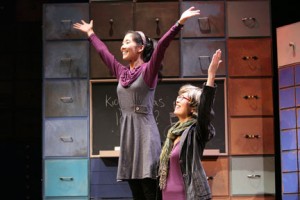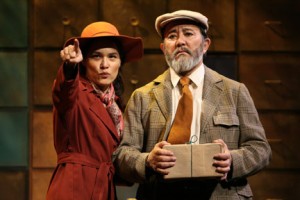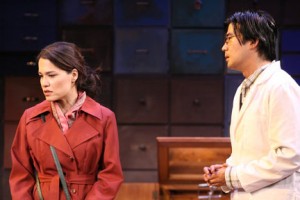This review was originally posted on Blogging Los Angeles and has been republished here with permission.
By Chris
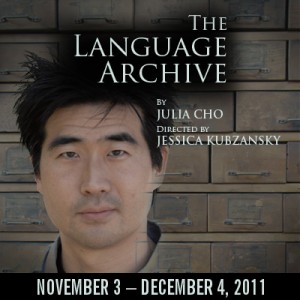 I should begin with the caveat that I have never reviewed a play before.
I should begin with the caveat that I have never reviewed a play before.
And while I enjoy going to the theater from time to time, I would hardly consider myself an informed critic.
And now that I’ve gotten my excuses out of the way, I’m happy to say that I really enjoyed the opening night performance of The Language Archive, which took place Wednesday night at the David Henry Hwang Theater in Little Tokyo.
The play is an exploration of how love, language, meaning, and relationships intersect, all portrayed through a mix of humor, philosophical meanderings, and emotional gravity. The East West Players did a very nice job hitting these various notes through most of the play, with my personal favorites being Ryun Yu as George and Jennifer Chang as Emma.
The play centers on an incredibly intelligent linguist whose marriage is falling apart because he doesn’t know how to express his feelings to her. And yet, she also seems to be unable to tell him what it is that she wants from him. Full disclosure: I have an MA in English and my first (and only) wife left due in large part to strained communications. So, you know, I’ve gotta back George a little bit on this one. His wife, Mary (Kimiko Gelman), plays games like leaving notes hinting at her unhappiness, but refuses to admit she’s left the notes or discuss her expectations openly with him.
The play takes its name from George’s work, the language archive, which involves cataloging and recording samples of dying languages. I particularly enjoyed Cho’s juxtaposition of dying languages and strained relationships, especially as it is illustrated through the relationship of Resten and Alta (Nelson Mashita and Jeanne Sakata), whose native language Elloway will die with them. Alta explains that the death of a language is simply the final breath of a dying culture: “Our world is already gone. No amount of talk talk talk will ever bring it back.” This observation not only evokes the idea of an ever-increasing level of homogeneity among world cultures—an enduring concern for Asian American communities, among many others—but it also reflects back on the failing marriage between George and Mary, whose inability to communicate may have more to do with their lack of a common culture than with their difficulties speaking to one another in a common language. George’s culture is that of a devoted linguist, and Mary is, as we come to learn later, unsure of what the hell she wants to do with herself.
There were a few things about the play that, while humorous, didn’t seem entirely necessary. In the opening lines of the play, for example, George is addressing the audience directly, and then Mary stops him and explains, “I’m right here. I can hear you.” While this unexpected break in form was certainly a good laugh, it didn’t seem to add anything substantial to the play, and didn’t return at any point beyond that first instance. Little moments such as this didn’t necessarily detract from the play, but they did have a cumulative effect of making the play feel as though it may be trying too hard to be cute and funny.
At other moments, the play felt as though it was about to cross the line from sentiment into sentimentality, or from pensive to overly philosophical. These moments seemed to be concentrated in the soliloquys delivered by Mary and Emma, speeches that seem almost to spell out motivations and conclusions for the audience that the writer might have feared wouldn’t fully be captured by the audience. Still, as close as Cho seems to come to crossing the line in these moments, for the most part the writing manages to stop just short of committing these types of literary sins. And when Ryun, Kimiko, and Jennifer delivered some of their more emotionally evocative lines of soliloquy, I thought they hit the mark quite well.
I imagine if we studied this play in one of the literary theory courses I took, we would probably spend at least a little bit of time talking about how feminist theory might view this play. The play opens with Mary performing the duties of the “traditional housewife,” and her escape to true happiness involves cooking—becoming a baker, taking on responsibility for Mr. Baker’s “seed” dough. Alta’s sense of security in her marriage to Resten is tied up inextricably with his appreciation for her cooking: “She would strap an oven to her back if she could.” Emma’s love of George is all tied up in her role as his lab assistant, her devotion to ensuring that everything in the lab is always set up just how he needs it to be. But my literary theory class is long over with, so I suppose I don’t have to linger on that point too long.
The set was very interesting and elaborate, but not to the point of being over the top or a distraction from the play itself. The music and sound effects were quite effective and seemed only to add to the play’s strengths. This was my first time visiting the David Henry Hwang Theater, and I found it to be a comfortable and relaxing environment for the play. All in all, I really enjoyed this play. Here are details from the press release:
All performances of THE LANGUAGE ARCHIVE will be staged at the David Henry Hwang Theater at the Union Center for the Arts at 120 Judge John Aiso St., Los Angeles, CA 90012. THE LANGUAGE ARCHIVE opens Wednesday, November 9, 2011 and closes on Sunday, December 4, 2011. Opening night will be accompanied by a pre-performance cocktail reception and a post-show reception with the cast and creative team. Performances are Wednesdays, Thursdays, Fridays, and Saturdays at 8pm, and Sundays at 2pm. Previews are Thursday–Saturday November 3–5, at 8pm and Sunday, November 6 at 2pm. The Pay-What-You-Can Performance will be held Wednesday, November 23 at 8 pm with a suggested $5 minimum donation.
General Admission Tickets range from $3 I – $41. Preview tickets are $20 for all seats. Please call theatre for opening night ticket availability and special event pricing. For ticket purchases or more information, please call East West Players at (213) 625-7000 or visit www.eastwestplayers.org. Senior, student and group discounts are available. Dates, prices, and details are subject to change.
ABOUT THE AUTHOR: Chris Corning is a writer living in Los Angeles. He earned his MA at California State University, Northridge, and he works for a nonprofit agency that publishes literature for recovering drug addicts. He also blogs for blogging.la.
All photos are courtesy of East West Players and Michael Lamont.
- Excited
- Fascinated
- Amused
- Disgusted
- Sad
- Angry

